Closing Ceremony of the 11th National Traditional Games of Ethnic Minorities Usher in a Bright Future for the Unity and Progress of All Ethnic Groups
As the flag of the games was lowered, the main torch went out, and the crowds dispersed, the 11th National Traditional Games of Ethnic Minorities dropped the curtain on the evening of September 16 in Zhengzhou, Henan.
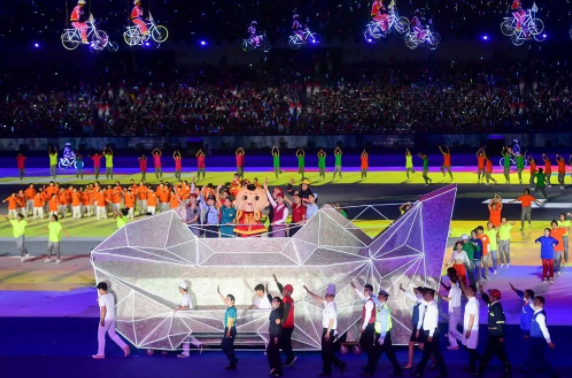
▲On September 16, actors performing at the closing ceremony of the 11th National Traditional Games of Ethnic Minorities in Zhengzhou City, Henan Province
In early autumn, by the bank of the Yellow River, a national sports boom and a celebration of national unity sparked by about 7,000 national athletes peaked in Henan after sweeping across China for nine days, an important birthplace of the Chinese nation.
This is an unprecedented national sports game telling stories about striving and progress. It is an action-packed national cultural event showing characteristic performances, a grand celebration with various ethnic groups singing hymns to the national reunion, and a gift to the 70th anniversary of the founding of the People’s Republic of China presented by all ethnic groups on the eve of the National Day.
Jointly Hold National Sports Event with the Spirit of Equality, Unity, Striving and Progress
In the past 9 days, brothers and sisters from 56 ethnic groups danced and sang, competed and communicated, met and made friends with each other. Now it is time to bid farewell to each other.
The closing ceremony was held in Zhengzhou Olympic Sports Center at 20:00 on September 16. Accompanied by the melody of the national games anthem Love My China, the flag of the national games was slowly lowered, the main torch was gradually extinguished, and the flag was passed on from Henan to Hainan, which means that the next national games will be held in Hainan.
“I am 58 years old this year. It is my first time to take part in the national sports games. It has broadened my horizon. The performances of various ethnic groups are wonderful.” Ma Taixin, a Hui athlete from Qinghai, said with pleasure, “I am reluctant to leave. The wonderful national culture, the cheerful national celebration and the happy national union are all unforgettable.”
This is action-packed national sports show. The national aerobics integrates the gentle folk dance with the powerful movements of aerobics to present a merry and smooth melody and a powerful sense of movement with high aesthetic value; in the springboard sports, a girl from Korean ethnic group wore a colorful folk costume to perform gracefully in the air, which was a feast for the eyes. “It is interesting and wonderful with many highlights.” This is the unanimous evaluation of the audience of the performances. On the evening of September 15, the organizing committee awarded first prizes to the 66 best programs of the 194 performances.
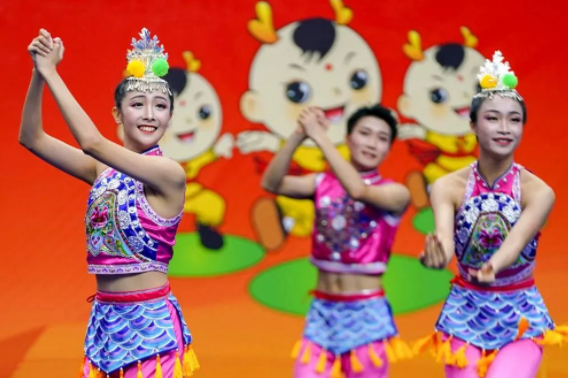
▲ Performance of national aerobics
The competitions in the arena are even more thrilling. In the final of the Yajia event, which is known as the Elephant Tug-of-war, was full of “seckillings” and also had some stalemates. In the 55kg-level final, Erdun Baiyila from Inner Mongolia played against Wei Xuejing from Guizhou. The two sides were tied in the first 90 seconds of two rounds that they had to have play-offs with 90 seconds of extra time in both rounds and another 30 seconds of extra time in the second round before Erdun Baiyira finally won.
Zhang Jianguo, the Chief Judge of Yajia, said: “The game is fierce but harmonious. all the athletes are very friendly, with no conflict between each other. They all shook hands before and after the game.” In the arena, athletes fought for the honor of national sports; in the audience, everyone cheered for the friendship among different ethnic groups.
According to the introduction of the Executive Committee of the games, the amount of participants of this game broke the record; both the competition and performance are high-level; the performances are varied and brilliant with features of nationality, culture, aesthetics, popularity.
Jointly Promote the National Unity and Culture Prosperity with Mutual Exchanges
Luo Hongying and Ciwang Quzhen, members of Tibetan crossbow team, have known each other for more than 20 years. This was the sixth time for them to attend the national games. From the snow-covered plateau to the Southern Frontier, from Guangdong to the colorful Guizhou, and from the vast grassland to the central plains, the two Tibetan athletes’ desire to win was overwhelmed by the joy of participation. They have paid more attention to the exchange and integration of national culture and cherished the precious friendship in the arena and off the stage.
“Brothers and sisters of 56 ethnic groups gather together for celebration and unity, appreciate national performances of various styles, understand characteristic folk customs and make acquaintance with friends from different ethnic groups and regions.” In the view of Ciwang Quzhen, the sports meet is a platform inheriting the national culture and a gala promoting national unity.
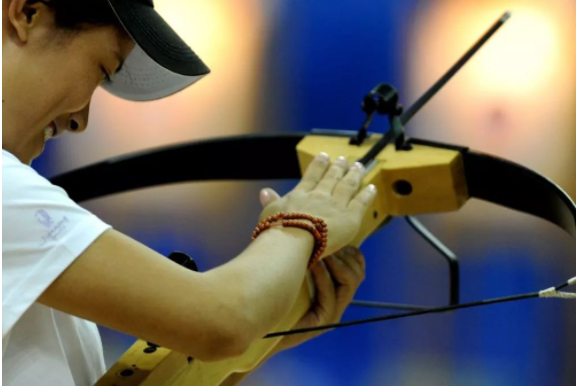
▲ On September 11, Tibetan female athlete Silang Sangmu enjoying the competition of standard crossbow in a relaxed mood
“Friendship First, Competition Second”; “Opponents, Also Friends”; “Cheer Each Other Up; all ethnic groups are part of the big family”. I am afraid there are no other games can make all ethnic groups develop a close friendship like this national games, which is more touching than the wonderful performances in the arena.
Traditional sports with distinctive ethnic and cultural characteristics, including snooker football, mobile pearl basketball and badminton shuttlecock, broke the geographical restrictions and attracted all ethnic groups to participate in them. The competition is less important than the display of culture, the exchanges and integration, the unity and progress of all ethnic groups.
Sports are expected to contribute to national prosperity and rejuvenation. Strong sports make China strong, and prosperous country ensures prosperous sports. In the past 66 years, the national sports have made great progress with the development of the 11 sessions of national sports games.
In Guangxi, 14 sessions of Guangxi Traditional Games of Ethnic Minorities have been held successfully since 1982, and more than 300 relatively complete traditional minority sports events have been developed.
In Tibet, since 2006, 22 events, including the Dangjiren horse racing festival and Lhasa kite flying, have been included in the national and autonomous region-level intangible cultural heritage protection list. The Yajia, Beiga and other events recommended by Tibet have been incorporated into the national ethnic games.
In Guizhou, 49 traditional sports training bases for ethnic minorities have been established around the province, under the climate advantage of “no cold winter and hot summer” and the mountain conditions, so as to build a great and strong province of mountain-featured sports.
“Unity is like a ball of fire, various ethnic groups communicate with each other and make common progress in the games; separation is like scattered stars, after the people return to hometown, the stories of various ethnic groups should be told to everybody.” As a Ningxia local from one of the 56 ethnic groups, Hui girl Zhang Jiarui showed the spirit of Hui nationality during the torch relay and the opening ceremony and met representatives from 55 other ethnic groups.” Although different ethnic groups have different customs and habits, people respect the differences and tolerate each other, forming a large loving family."
Although the 11th National Traditional Games of Ethnic Minorities came to an end, the close friendship of all ethnic groups which share the same destiny, common fate and mutual affinity, has spread all over China across great rivers, snowy mountains and grasslands. The sense of community of the Chinese nation has taken root in the hearts of the people of all ethnic groups, thriving with flourishing branches and leaves.
Jointly Create a Better Future of Chinese Nation with Mutual Assistance
Li Chunfu and Wang Hui, athletes from the De’ang ethnic group in Yunnan Province, are friends from the same village. In the games, they performed a traditional ethnic sport of spinning top. “We have played this since we were young, and we feel exciting and proud to perform it on the national stage,” said Li Chunfu, who took part in the games for the first time.
In fact, it was also the first time for Li Chunfu and Wang Hui, who are from a small village of China-Burma border area - Baiyan Village, Zhenkang County, Lincang City, to go out of Yunnan. They not only brought wonderful spinning top performance, but also brought the good news that the De’ang nationality had alleviated poverty at the end of 2018.
“The cement road has been built, the tap water system has been set up, and we have moved to a two-storey house. There have been a lot of changes in recent years.” Wang Hui and his families have more than 20 mu of sugar cane, Li Chunfu and his families have 16 mu of sugar cane and more than 40 mu of corn. Now, their annual net income is about RMB 50,000. They returned home from Zhengzhou with the joy of participating in the games during the harvest season of corn. It is another harvest year.
No nationality should be left behind in the process of building a moderately well-off society in an all-round way and achieving great rejuvenation of the Chinese nation. China’s success in overcoming poverty and building a moderately well-off society proves that all ethnic groups have stood together regardless of situation, forged ahead in unity and achieved common prosperity.
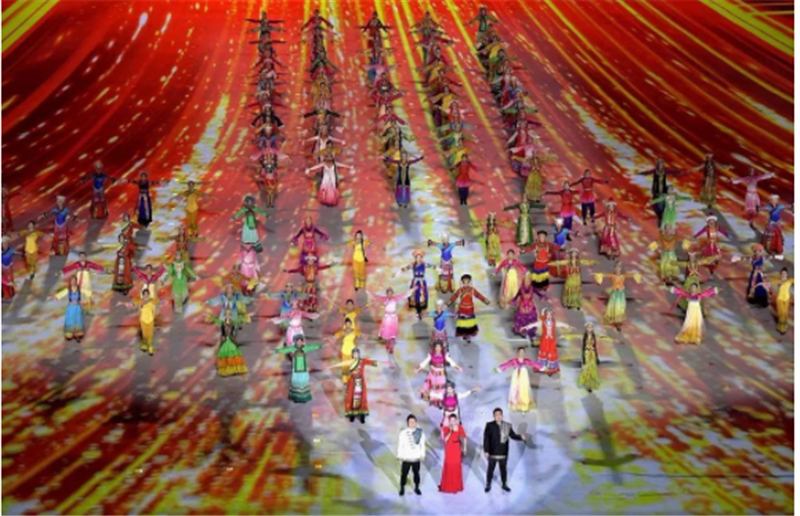
▲On September 16, actors performing at the closing ceremony
Behind the dramatic change of the De’ang nationality is one of the largest and fastest anti-poverty struggles in human history. By the end of 2018, there were only 6.02 million rural poor people in eight ethnic minority provinces and autonomous regions, 25.19 million fewer than that at the end of 2012, with a cumulative decrease of 80.7% over the past 6 years. China has made unprecedented achievements in rapid economic growth and poverty relief, according to a 2018 World Bank report.
In fact, over the past 70 years, thanks to the efforts of people of all ethnic groups in China, the eight ethnic minority provinces and autonomous regions have undergone earth-shaking changes.
As the games come to an end, athletes from all walks of life will return to work. Ciwang Quzhen in the Tibetan crossbow team will return to Wanquan Primary School in Bomi County, Linzhi City, where she has acted as a teacher for 16 years. She will continue to educate the children and guard the “flowers of the motherland” on the snow-covered plateau; Wenbo, a member of Henan male pearl team, will return to the Sports College of Zhengzhou University for further study. After graduation, he plans to be a sports teacher to popularize pearl ball sports among children; Yang Wenwu, a Yunnan single bamboo rafting team member, will return to the special police force in Yanshan County, Wenshan Zhuang and Miao autonomous prefecture and continue to protect the homeland of the local people. In the arena, they cheered for the promotion of national unity; in their workplace, they contribute to the realization of the great rejuvenation of the Chinese nation.
About ten days later, we will celebrate the 70th anniversary of the founding of People’s Republic of China; two years later, we will celebrate the 100th anniversary of the founding of the Communist Party of China. Four years later, when the 12th national games are held on the coast of the south China sea, the great rejuvenation of the Chinese nation will be closer; Chinese people will be richer, and the country will be more prosperous.
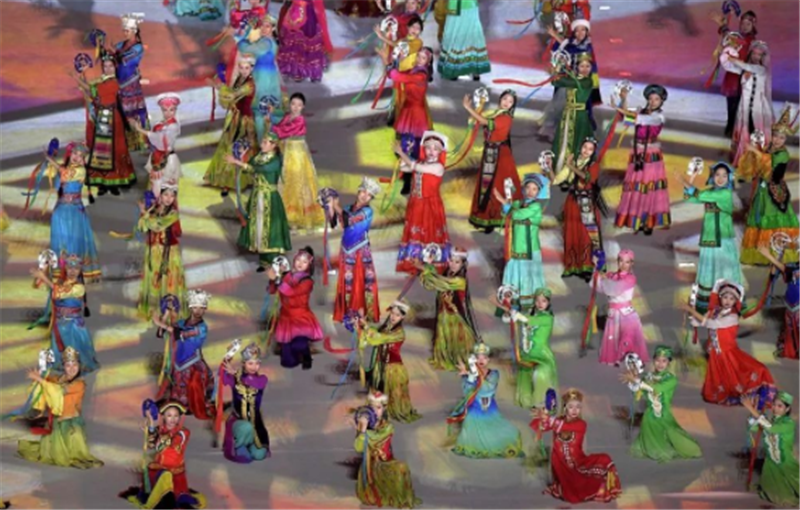
▲On September 16, actors performing at the closing ceremony
“Jointly Realize the Dream of China with Concerted Efforts of the Chinese Nation.” This is the common wish of brothers and sisters of the 56 ethnic groups. With mutual assistance and loving care, the life of people will be better and the Chinese nation will be more prosperous. Let us make concerted efforts, fight dauntlessly and jointly create a brighter future of all ethnic groups!